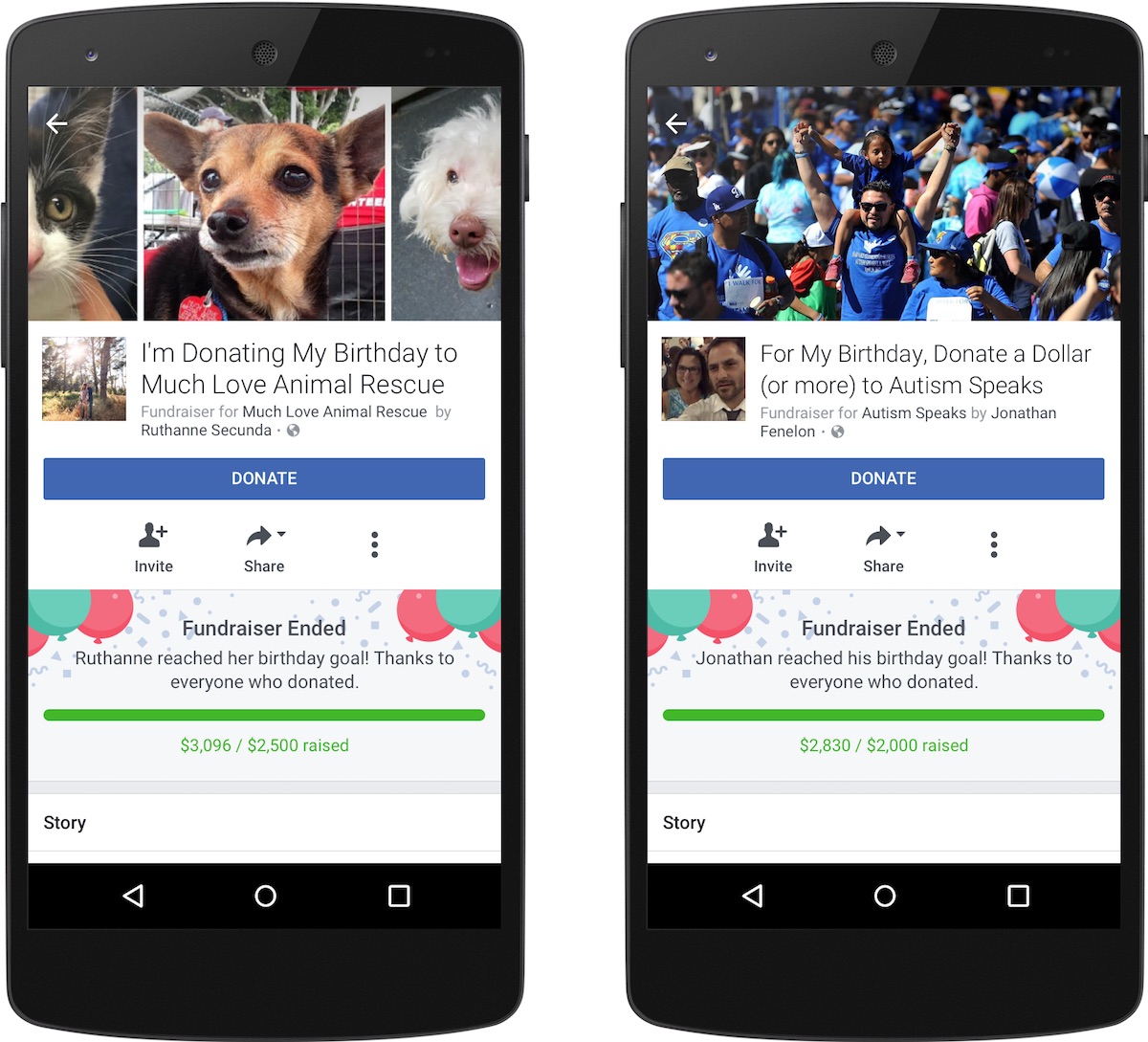페이스북(Facebook)은 ‘생일 기부 캠페인’을 도입한 이후로 큰 성공을 거두고 있다고 발표했다.
생일 기부 캠페인은 사용자가 선택한 비영리 단체에 기부금이 전달되는 시스템으로, 출시한지 1년 만에 약 $300 million(약 3천370억 원) 을 조달했다고 페이스북은 밝혔다.
현재 페이스북은 75만 개 이상의 비영리 단체와 연결되어 있으며, 현재 가장 많은 모금을 받는 대표적인 단체는 세인트 주드(St. Jude), 알츠하이머 학회(Alzheimer ‘s Association), 미국 암 협회(American Cancer Society), 어린이 기아구제 캠페인 노 키드 헝그리(No Kid Hungry), ASPCA 등이다.
또, 페이스북은 기부금 마련에 참여하고 싶지만, 어떤 비영리 단체에 기부해야 할지 고민하는 사용자들을 위해 추가 설명을 기재할 예정이다.
페이스북은 지난해 11월, 기부금은 예외로 거래 수수료를 받지 않겠다고 발표한 바 있다. 또, 기부금 모두 비영리 단체로 전달되기 시작하면서, 단순히 이벤트 성에 해당하는 캠페인이 아닌 실질적인 결과를 낼 수 있는 효율적인 캠페인으로 성장하고 있다고 말했다.
하지만, 캠페인 규모가 커지면서 개인 기부자의 개인 정보에 대한 우려의 목소리도 커지고 있다. 일부 비영리 단체는 소수집단에 향하는 성차별 등의 부적절한 발언이 생기지 않도록 페이스북이 더 노력해야 할 것이라고 전했다.
펀드레이징 제러미 해치(Jeremy Hatch) 컨설턴트는 “페이스북의 생일 기부 캠페인은 기부자와 비영리 단체 간의 윤리적 관계를 흐리고 있다”라며 “비영리 단체가 페이스북에 너무 의존하지 않도록 주의를 요해야 할 것”이라고 말했다.
Facebook marked the first anniversary of its birthday fundraisers by revealing that more than $300 million in donations have been raised through the feature, which lets users mark their birthdays by creating a donation drive for an organization of their choice.
About 750,000 non-profits currently have access to Facebook’s fundraising tools (but not every user, since they haven’t rolled out to all countries).
The company also said that it is adding several new features based on feedback. These include allowing Pages to create and donate to fundraisers, as well as the ability to add matching donations and co-organizers to fundraisers. Donors will also be able to choose if they want to set up a recurring monthly contribution.
For people who want to create a birthday fundraiser but don’t have an organization in mind already, Facebook plans to include more information about charities in the feature’s selection tool. The company said its fundraising feature’s top beneficiaries include St. Jude, the Alzheimer’s Association, the American Cancer Society, Share Our Strength—No Kid Hungry and the ASPCA.
Last November, Facebook removed its 5% fee on donations, which means all money goes to non-profits. For many charities, Facebook fundraisers are now the most frictionless way to raise donations, including from people who might otherwise never visit the charity’s own donation links. Facebook fundraisers are a notable example of how social media activism can actually translate into tangible results instead of yet more memes–but, of course, whenever Facebook releases any self-congratulatory announcements, it’s a good idea to take a step back and look at the potential downsides.
As with almost every other Facebook feature, its fundraising tools have prompted concerns about privacy, particularly donor privacy, which is considered sacrosanct by many organizations (Facebook lets users decide if they want to share their donation with friends). Some charities also have qualms about benefiting from Facebook fundraisers until the company does a better job of policing hate speech, especially if the purpose of their work is aiding marginalized or persecuted minority groups.
In an insightful blog post from last November, fundraising consultant Jeremy Hatch argued that fundraising on Facebook also eliminates the relationship between donors and organizations, “where there are established norms and ethical practices.” He added that non-profits should reconsider before they grow increasingly reliant on a company whose ultimate goal is to gather and monetize user data.
At the same time, Facebook’s reach leaves many organizations with little choice but to use the platform so they don’t miss out on much-needed funds. One notable example of how effective Facebook fundraisers can be is the more than $20 million raised by users on behalf of RAICES to help migrant families separated at the U.S.-Mexico border by the Trump administration.
[fbcomments url=“http://ec2-13-125-22-250.ap-northeast-2.compute.amazonaws.com/2018/08/17/interpress-facebookbirthday/” width=“100%” count=“off” num=“5″ countmsg=“wonderful comments!“]




![[출발 메타버스 여행] 딥페이크와 AI 그리고, 독점 기업 넷플릭스](https://mobiinsidecontent.s3.ap-northeast-2.amazonaws.com/kr/wp-content/uploads/2023/06/27110252/thumbnail_image_1f222ffa-218x150.png)
![[온라인 마케팅에서 실패는 당연하다] 메타(Meta) 광고의 위기 그리고 마케터의 위기](https://mobiinsidecontent.s3.ap-northeast-2.amazonaws.com/kr/wp-content/uploads/2023/02/02111246/2023-02-02-11-11-40-218x150.png)
